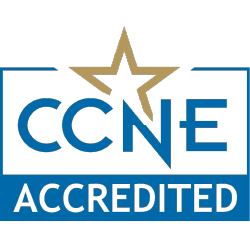
* In comparison with 5 ABSN programs in Illinois
State AuthorizationStudents who reside in Illinois, Indiana, Iowa, Kansas, Kentucky, Maine, Missouri, New Mexico, Vermont and Wisconsin or who are willing to move to one of those states are welcome to apply to the ABSN program. Please see our State Authorization page for more detailed information.

Accredited by the Commission on Collegiate Nursing Education (CCNE)*
Accreditation and Disclaimers
The accelerated online BSN program is accredited by the Commission on Collegiate Nursing Education (CCNE),* and the university is accredited by the Higher Learning Commission (HLC).
The baccalaureate degree program in nursing and the master’s degree program in nursing at Elmhurst University is accredited by the Commission on Collegiate Nursing Education, 655 K Street, NW, Suite 750, Washington, DC 20001, 202-887-6791.
Your enrollment advisor will help you determine which prerequisites you need before you can start the online ABSN program. If you haven’t earned credit for these courses prior to your start date, your enrollment advisor will help you with next steps. You will need 25 credit hours of prerequisites courses, and you must have earned a "C" or better within these prerequisite courses:
Focuses on theories, principles and processes for adult populations experiencing common health problems within priority areas of care. Emphasis is on nursing care of the older adult. A systems framework is used to discuss clinical prevention and patient-centered care for select chronic care issues, including end of life. Introduces methods for evidence-based decision-making to support the role of provider of care. The beginnings of leadership skills and ethical practice in promoting optimal care outcomes in acute and community-based systems are fostered. Includes supervised laboratory experiences and clinical practicum.
NRS 315 Adult Health IIFocuses on theories, principles and processes for care of adults from diverse populations experiencing select acute, chronic and complex health problems. A systems framework facilitates integration of knowledge from previous nursing and science courses. The roles of provider and designer of nursing care are developed. Application of evidence-based methods for use in decision-making support basic leadership skills and ethical practice in promoting optimal outcomes. Includes a supervised clinical practicum in a variety of settings.
NRS 316 Family Health: ChildrearingFocuses on theories, principles and processes related to care of the child from infancy through adolescence within the context of family. Using a systems framework, delivery of family-focused nursing care emphasizes clinical prevention, health promotion and health restoration. Influences of genetics, environment and social policies on family and child health nursing roles are considered. Provider, designer and manager of care roles are developed. Basic leadership skills and ethical practice are fostered in a supervised clinical practicum in a variety of settings.
NRS 409 Family Health: Child BearingFocuses on theories, principles and processes related to reproductive health from early to older adulthood within the context of family. Using a systems framework, family-focused patient-centered care addresses perinatal, women’s and men’s health. Clinical prevention, genomics and end-of-life issues are examined. Provider, designer and manager-of-care roles in ethical practice with vulnerable populations are developed. Basic leadership skills are demonstrated through values clarification and conflict management in family-centered clinical decision making and management of care outcomes in a supervised clinical practicum in a variety of settings.
NRS 411 Synthesis: Adult Health III Complex CareFocuses on synthesis of theories, principles and processes in nursing roles of provider and designer/manager/coordinator of care in complex health care systems. Care for diverse groups of patients with multisystem health problems is addressed. Emphasis is on increasing autonomy and collaborative leadership in interprofessional teams, ethical practice and achievement of safe and quality care outcomes. Includes practice in a supervised clinical practicum.
Our clinical placement team will work closely with you to ensure your placements meet university and national guidelines. These frequently asked questions will help you better understand the clinical placement services we provide in this accelerated nursing program.